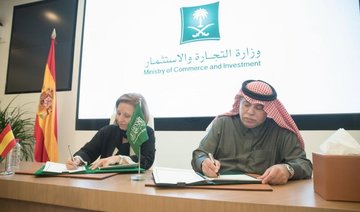Crown Prince Mohammed bin Salman is scheduled to meet King Felipe VI in Madrid during his official visit to Spain.
The crown prince’s stopover follows a two-day official visit to France and a tour lasting several weeks in the US. He began his current foreign trip — to promote the Kingdom as a growing investment hub in line with Saudi Vision 2030 — in Egypt, before traveling to Britain for another official visit.
Mohammed Al-Khunaizi, a Shoura Council member, told Arab News: “The visit assumes great significance as the two countries share cordial relations and the Kingdom is looking for key partners in line with the National Transformation Program and Vision 2030.”
“The focus during the visit is more on expanding cooperation in diversified fields including defense, security, digital economy, renewable energy and the investment sector,” he said.
Majed bin Abdullah Al-Hedayan, a Riyadh-based analyst and legal adviser, told Arab News: “The visit of the crown prince is aimed at promoting a new strategic partnership between the two countries.”
 “It will be supportive of cooperation in future investments in the knowledge economy and renewable energy in line with Vision 2030,” he said.
“It will be supportive of cooperation in future investments in the knowledge economy and renewable energy in line with Vision 2030,” he said.
The Kingdom and Spain have shared common approaches toward many global and regional issues, notably the peace process in the Middle East where the two sides have played a significant role: Spain through the Madrid Peace Conference (1991) and Saudi Arabia through the Arab Peace Initiative proposed by King Salman (crown prince at the time), which later developed into an initiative adopted by the Arab League Summit in Beirut in 2002.
King Felipe VI visited Riyadh in January 2017, and while speaking at the Riyadh Chamber of Commerce and Industry he said that bilateral relations between the two countries rested on long-standing historical and cultural ties. The Kingdom and Spain are close business allies.
The volume of trade between the two countries annually is estimated at more than $3.5 billion, with a focus on commodities including chemicals, metal products, medical supplies and wooden products.
Saudi Arabia is reportedly Spain’s third largest Arab partner and ranked 12th among exporter countries to Spain from outside the EU.
The countries also share close cultural ties. Roads of Arabia, the premier exhibition of Saudi archaeological masterpieces which highlights the Kingdom’s cultural heritage internationally, began in 2010 at the Louvre Museum in Paris, then moved to Barcelona.
The Roads of Arabia exhibition was hosted by the La Caixa Foundation in Barcelona from Nov. 12, 2010 to Feb. 27, 2011.
Another example of close historical and cultural ties was the “From Qurtuba to Cordoba” exhibition in Riyadh in 2013.






















